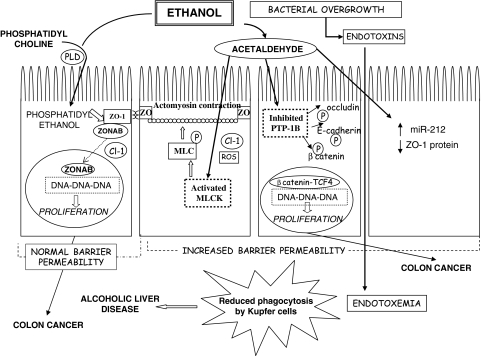Fig. 2.
Multiple pathways of ethanol toxicity in the intestinal epithelium leading to diverse pathological effects. Formation of phosphatidylethanol from ethanol and phosphatidylcholine by the membrane enzyme phospholipase D (PLD) can cause dissociation of the transcription factor ZONAB from ZO-1 and its translocation to the nucleus, leading to the activation of genes involved in re-initiation of proliferation. These effects occur in the absence of changes in intestinal barrier function. Acetaldehyde, produced in intestinal cells by the enzyme alcohol dehydrogenase can activate phosphorylation of myosin light chain kinase (MLCK), either directly or through the formation of reactive oxygen species (ROS), that in turn phosphorylates myosin 2 light chain (MLC) and causes the contraction of the perijunctional actomyosin ring and increases epithelial barrier permeability, with claudin 1 (Cl-1) internalization. Acetaldehyde can also inhibit the protein tyrosine phosphatase 1B (PTP-1B), blocking occludin, β-catenin and E-cadherin in their phosphorylated state. Phosphorylated occludin is internalized and contributes to barrier dysfunction. Phosphorylated β-catenin dissociates from E-cadherin and migrates to the nucleus where, with the transcription factor TCF-4, activates genes involved in proliferation. Ethanol also induces down-regulation of the ZO-1 protein as a consequence of the upregulation of miR-212 and this contributes to TJs opening. Chronic ethanol consumption can enhance intestinal bacterial overgrowth with increased production of endotoxins that can freely migrate across the permeabilized intestinal mucosa, leading to endotoxemia. In the liver, acetaldehyde reduces endotoxins clearance by Kupfer cells and can contribute to alcoholic liver disease (ADH). Activation of proliferative events by different ethanol metabolites can contribute to the development of colon carcinogenesis. Modified from [17]

